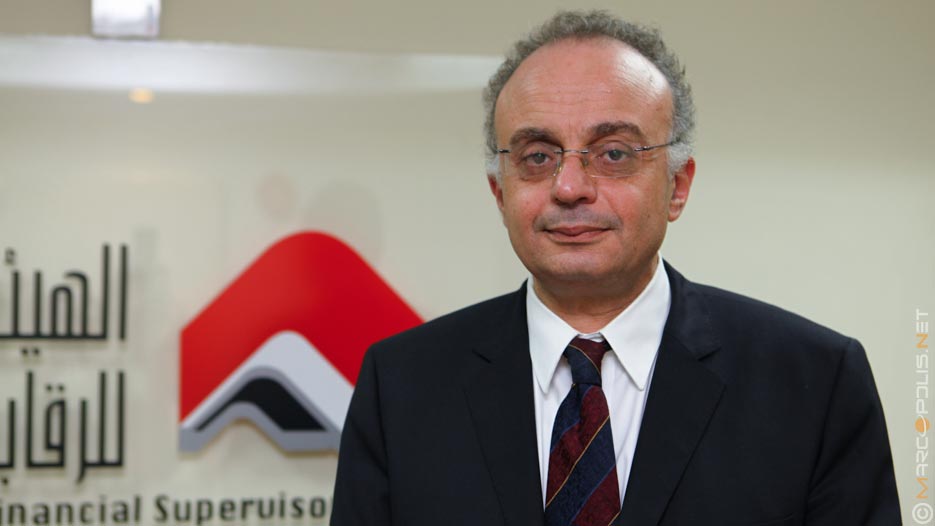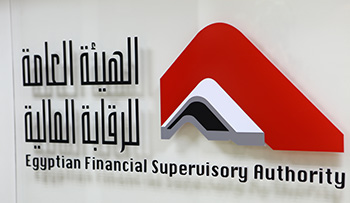Egypt is mainly an equities market, insurance and mortgage markets are developed but still limited – EFSA
“EFSA is the result of unifying all the financial regulators. Our Constitution mentions EFSA, or the non-banking finance regulator as an independent body. We regulate 6 activities, capital markets, insurance, private pensions, mortgage, leasing and factoring. And as a recent development, for the first time in Egypt, microfinance. It is challenging.”
Interview with Sherif S. Samy, Chairman of Egyptian Financial Supervisory Authority (EFSA)

What is your personal view of the Egyptian economy today?
Egypt is ready for take-off, after 3 difficult years. We are witnessing more and more interest and more activity on the stock market. Just today we accepted 2 tenders from foreign companies. There is interest. We are in a positive wait and see period. We don’t quite have the excitement of 2009 and 2010 yet, but there is enough built up flow, deals, questions. We are issuing new licenses to both foreign and Egyptian companies. I am reasonably optimistic.
How does the financial sector in Egypt compare with other states in the region, your neighbors, in terms of development?
You can’t look at the Middle East as one homogenous region. Within it, there is the oil rich Gulf. Other countries cannot compare to that. Excluding the Gulf nations, we have the largest, most sophisticated, most advanced financial sector, be it banking or non-banking. We also have a very large talent pool among our people. A lot of banks in the Gulf are staffed by Egyptians. Next month we are celebrating the diamond jubilee of the first law regulating insurance in all the Middle East and Africa. It was issued in Egypt in 1939. This tells us that historically Egypt had a more developed financial sector. Obviously now, the Gulf countries have larger capital markets and a larger banking sector. I prefer to look at the sophistication, the instruments, and the regulations. Size is not the only thing that matters. Additionally, we are a huge consumer market. As a market with over 85 million people, Egypt attracts a lot of industries, trade and services. I believe our financial services sector is adequately equipped to service such businesses that come to Egypt.

What do you identify as the main challenges of the sector?
That depends on the various components. We, the EFSA, do not regulate banks, so I will not comment on them much. The banks are now trying to comply with Basel 3, they are well capitalized. We have a very strong central bank. I sit on the board; I see a lot of effort being directed at capital adequacy, liquidity and risk management. The real challenge for Egypt is financial inclusion. In Egypt, 80% of the population does not use banks. We are trying to reach that huge element of the population. So the challenge for the banking sector is financial inclusion, not stability or profitability where we are on a good track.
In other non-banking financial services, the capital market is reasonably developed. We are yet to have instruments for futures, for options. We do not have commodities trading yet. We are mainly an equities market, a spot equities market. Insurance is well developed but the market penetration is still limited. More awareness is important. Insurance contribution to GDP in Egypt is one of the lowest in the region. Tunisia, Lebanon and others exceed us. It’s a matter of attracting more companies and creating more awareness among Egyptians of the benefits of insurance. Mortgage is another important track. While the mortgage market is over 10 years old, the numbers are very limited. The problem is not with financing availability or the numbers of people seeking mortgages. The problems are mainly due to title registration. A lot of housing units in Egypt are not registered for one reason or another. This of course is beyond our scope. However that is the main reason the mortgage market has not taken off like in other countries.
We regulate 6 activities, capital markets, insurance, private pensions, mortgage, leasing and factoring. And as a recent development, for the first time in Egypt, microfinance. It is challenging.
The EFSA was established in 2009 by merging or replacing 3 other major regulating authorities. Those were the Capital Market Authority, Egyptian Insurance Supervisory Authority and the Mortgage Finance Authority. What can you tell us about the capital market?
EFSA is the result of unifying all the financial regulators. It was a model created in the UK, used in Australia and a lot of other countries. We regulate 6 activities, capital markets, insurance, private pensions, mortgage, leasing and factoring. And as a recent development, for the first time in Egypt, microfinance. It is challenging. Our Constitution mentions EFSA, or the non-banking finance regulator as an independent body. Most constitutions will spell out the central bank. But wisely, in January during the last amendment, EFSA was included. It lays stress on the importance of the independence of the financial regulator and adds to the credibility of the country. We are fully independent. We do co-ordinate with the government but they cannot direct us on what to license or not to license, or who to authorize. Having so many areas of activity, we have to balance our efforts and our focus. We cannot, for instance, focus on developing capital markets and neglecting other areas. As far as we can, we work on many parallel tracks.
Last year we successfully upgraded the regulation of capital markets. We had new listing rules, new directives for funds. We introduced new products like ETFs (Exchange Traded Funds) and Real Estate Funds. In the mortgage front, we made major changes to the law, allowing more instruments, to allow other ways to finance it, not just financing the buying and building. This includes leases with option to buy and Sharia-compliant products that are more of a partnership than an outright loan. We also have a Mortgage Subsidy Fund to make it more affordable for low income homebuyers. The law defines who are the beneficiaries of this fund, what income bracket qualifies. This is important for a significant portion of the Egyptian population. Factoring is also an important activity. It has quadrupled in 4 years. This is important for Egypt.
In Insurance, today we have 31 companies. However, the business has not yet taken off. Last year, the premiums were USD 2 billion. That is a very modest figure for a country as large as Egypt. However, that reflects a 20% growth. However, I believe, we will see a positive jump in figures in the next 4 years, as we continue to modernize the laws, promote insurance and receive interest from several multinationals for operating licenses. We even look forward to introducing new products in the market. For instance we are working on regulating private sector health care insurance. This isn’t currently regulated. These will add to the number of insurance companies in the market and the figures will reflect that business. Today it is a USD 700-800 million business. Gradually we will see better figures.
Will there be any new regulation or legislation introduced soon? You mentioned Microfinance.
Yes we the first law regulating Microfinance has just been issued. Mortgage law amendments are done. We are changing some articles in capital markets law. We are looking at better ways to address mergers and acquisitions. We are addressing sukuks, Sharia-compliant products. The insurance law dates back to 1981. We are currently working on a new draft of the law. We are also looking to introduce health care insurance and micro-insurance. The new law also needs to reflect new technologies. In 1981 you couldn’t buy an insurance policy via the internet. The new technologies allow better distribution for insurance companies. As the law stands, it is very restrictive. Our priority for 2015 is to have a new insurance law.
We also regulate private pension funds. We do not regulate the government pension funds. Currently we regulate around 650 private pension funds, with about 42 billion Egyptian Pounds. This is about USD 6 billion. These need to be better managed. We are issuing directives allowing them to have their assets managed by professional asset managers. Earlier it was done by in-house managers who don’t have the right skills or experience to manage the USD 6 billion optimally. We are also trying to enhance the governance of such funds because it is peoples’ futures. They are subscribing to the pension fund in the hope of benefits maybe 30 years down the line. So these funds must be managed prudently and smartly.
Do you also take on the responsibility of spreading insurance awareness among the Egyptian population? Is this a big challenge?
Awareness of insurance is definitely a challenge. But it is more than that. There is the economic situation. When people don’t have a lot of surplus income once they have covered their basic needs, it is hard to entice them to buy insurance. Also remember, in Egypt, as in Italy, families play an important support role, especially in the villages. The whole village is an extended family. Not so many people feel alone and isolated. Some people have religious issues with insurance. Therefore, we have a Sharia-compliant insurance product, called Takaful. Currently about 8 or 9 of our 31 insurance companies operate under the Takaful model. Ultimately it is insurance, but we are happy to provide an insurance product that makes people comfortable.
Another thing is the government does not insure its assets. The government in Egypt is a very old and large bureaucracy. They don’t insure their assets because it is very expensive. Finally, in advanced countries, professional liability insurance is a big part of the insurance business. Doctors, lawyers, auditors are all covered by professional liability insurance. They protect themselves from possible malpractice and breach of conduct allegations, which carry very heavy penalties in the US and Europe. It is not the same case here. A surgeon, CPA or lawyer here does not feel obliged to have a half a million dollar insurance policy to protect himself. As society becomes more sophisticated and standards of professional conduct develop, it will become a must. But I don’t see it happening very soon. As incomes and savings levels of households increase, we will see more people opting for insurance. Awareness will come. I assume the younger generation will be more interested in insurance coverage. Also, families are not as large as they used to be, not as close knit as they used to be. This will help convince people that they need insurance for their old age, for health, for cars, for homes. It is a mix of many reasons. And we look around us, at the developments in Turkey, Tunisia and Lebanon. We shouldn’t be far behind them.
Could you please summarize your priorities?
As EFSA regulates so many activities, we have a lot of priorities. The new law is very important, a lot of effort has gone into it. We started from scratch with it. There will be a lot of work and changes. We will be regulating both companies and NGOs. We have put a lot of effort into setting up the units, issuing decrees, directives and regulations. Microfinance is an important area. In capital markets, I hope we can introduce short selling and look ahead to future contracts towards the end of 2015. In insurance, we will have a new law. Those are our 3 top priorities.
FAIR USE POLICY
This material (including media content) may not be published, broadcasted, rewritten, or redistributed. However, linking directly to the page (including the source, i.e. Marcopolis.net) is permitted and encouraged.